Foreign Minister Says Iran 'In A Hurry' To Reach A Deal In Vienna
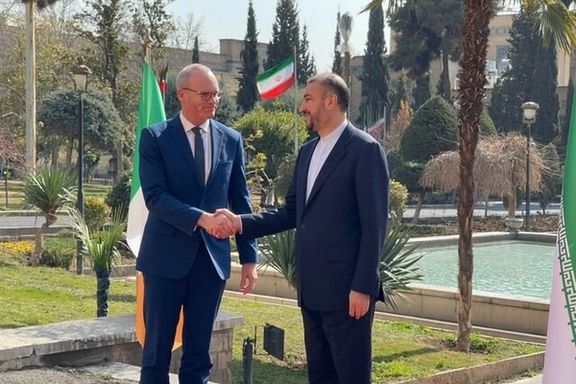
Iran's foreign minister has said Tehran is in a hurry to reach a nuclear deal in Vienna, although it suspended talks for about five months in 2021.

Iran's foreign minister has said Tehran is in a hurry to reach a nuclear deal in Vienna, although it suspended talks for about five months in 2021.
“It would be better for us to reach a deal today, rather than tomorrow”, he said, adding that “we're in a rush for achieving a deal, but a good one that serves our national interests”.
Hossein Amir-Abdollahian made the remarks on Monday during a joint press conference with his visiting Irish counterpart Simon Coveney.
Amir-Abdollahian said, “West must stop playing with the issue of time and text” and called on the other parties to work towards a swift deal, which is something all the other participants were attributing to Iran.
Before the volte-face today, Iran had reiterated that it wouldn’t accept any timeframe for the talks while other sides accused the Islamic Republic of wasting time so that it stockpiles enough fissile nuclear material to be able to make a nuclear bomb.
Critics said that one of Iran’s strategies to prolong the negotiations was its insistence on maximalist demands, including the lifting of all Trump era sanctions, including those not related to the nuclear issue.
Earlier in the day, foreign ministry spokesman Saeed Khatibzadeh said Tehran is awaiting a political decision by Washington on nuclear talks and reiterated that a deal is possible "tomorrow" if the US provides guarantees.
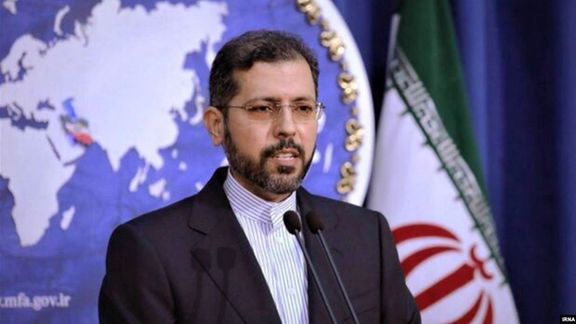
Iran's says it is awaiting a political decision by Washington on nuclear talks and reiterated that a deal is possible "tomorrow" if the US provides guarantees.
“There will be no need to [wait] until the end of February if the European and American sides respond to Iran's initiatives today,” spokesman Saeed Khatibzadeh told a press conference in Tehran. “We can announce an agreement in Vienna tomorrow…The agreement is awaiting the other side's political decisions.”
Khatibzadeh said Iran needed "concrete guarantees" that that the US would not again withdraw from the 2015 deal, the JCPOA (Joint Comprehensive Plan of Action) as it did under President Donald Trump in 2018.
The spokesman was referring to reports of informal briefings that the end of the month constituted a deadline, a notion Iran has rejected. Khatibzadeh said that Iran and remaining JCPOA signatories – China, France, Germany, Russia, and the United Kingdom – were "seeking to get guarantees from the US” over Washington lifting all sanctions incompatible with the JPCOA and the United Nations Security Council resolution 2231, which endorsed the nuclear agreement.
Khatibzadeh reiterated that such sanctions should be removed "irrespective of what they are called or false labels," referring to statements by Trump administration officials that sanctions under the rubric of ‘human rights,’ ‘links to the leader’s office,’ or other ‘labels’ were designed to complicate any subsequent attempts to restore the JCPOA.
Mohammad Marandi, media adviser to Iranian negotiators in Vienna, told Russia's Sputnik that it is too early to know whether the US would accept Iranian conditions. "There is a significant possibility that there will be an agreement...as we see some movement from the US and Europe,” he said. “But there is also a chance there won't. Everything will depend on Washington and on whether they really want it."
Marandi told Sputnik that Iran wanted a "proper verification process," meaning transparency over the removal of sanctions. He reiterated that despite its pledges under the JCPOA, the US even after signing the agreement maintained formal and informal sanctions that precluded Iran from benefiting fully from the agreement.
International sanctions imposed by the United Nations Security Council were removed in 2015 and both the United States and Europe complied by removing sanctions incompatible with the Joint Comprehensive Plan of Actions (JCPOA).
'Behind closed doors'
"In 2015, we made sure to implement the deal,” Marandi said. “It was [President Barack] Obama, who didn't. Behind closed doors, he told the Treasury and various firms not to work with us."
He did not offer any evidence for claiming Obama obstructed efforts to comply with JCPOA.
Ali Shamkhani, Iran’s top security, tweeted Sunday that a “US political decision to realize or refuse to accept the requirements of a credible and lasting deal based on the principles accepted in JCPOA can replace speculation." Shamkhani suggested in another tweet that he was not optimistic as “western parties” − presumably meaning the US and western Europeans − were evading real commitments.
Asked about Shamkhani's remarks at his press conference, Khatibzadeh said developments in Vienna had reached “a difficult stage” with “important and key matters that all sides are following up closely.”
A source familiar with the talks told Iran International Monday that Iran was making “unrealistic demands,” which if pressed meant the “talks are bound to fail.” But Russia's envoy to the talks, Mikhail Ulyanov, wrote in a tweet Sunday that a meeting between remaining JCPOA participants without Iran had confirmed “significant progress has been made in the course of negotiations.”
An Iranian source familiar with the talks told Iran's Press TV Sunday that “rumors” were unfounded that the US would engage directly with Iran in the JCPOA Joint Commission. Tehran has insisted that Washington cannot take part in JCPOA structures until it returns to the agreement.
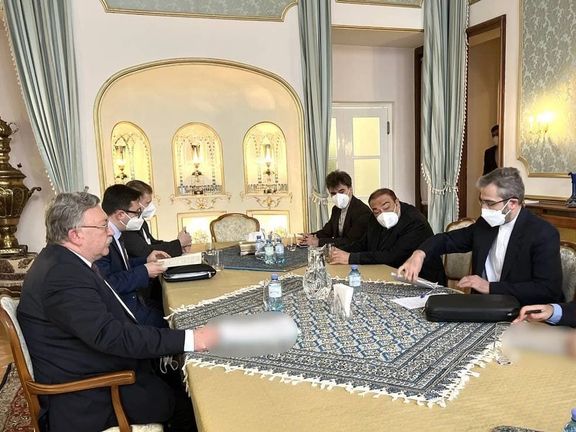
Iranian and Russian negotiating teams, including specialists, have met bilaterally in Vienna to discuss issues remaining in reviving the Iran nuclear deal, Iranian media reported.
The negotiators held detailed talks in the Austrian capital Sunday. Ali Bagheri-Kani, Iranian Deputy Foreign Minister for Political Affairs, and Mikhail Ulyanov, led the session but others participating included Mehdi Safari, Iran’s deputy foreign minister responsible for ‘economic diplomacy.’
IRNA says that there is no decision to hold a formal JCPOA commission meeting.
The official news agency IRNA reported Saturday that representatives of Iran’s central bank, the oil ministry and other experts had in recent days re-joined working groups discussing agreement on restoring the JCPOA (Joint Comprehensive Plan of Action).
Wang Qun, China’s ambassador to international organization in Vienna, confirmed to Iran International Saturday that the nuclear talks were reaching a concluding stage.
The talks, which began last April, have centered on the question of which United States sanctions infringe the JCPOA, from which President Donald Trump withdrew the US in 2018, and how precisely Iran’s nuclear program, expanded since 2019, should be brought back within JCPOA limits.
The most stringent ‘maximum pressure’ sanctions, which sent the Iranian economy into two years of deep recession and continuing financial crisis, target Iran’s oil exports and its financial sector.
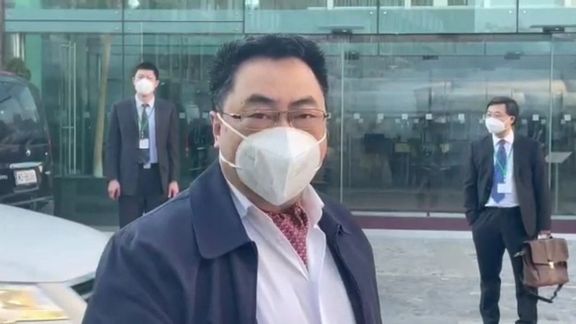
China’s representative at the Vienna multilateral talks to revive Iran’s nuclear deal says the negotiations are in the concluding stages.
Wang Qun told Iran International on Saturday that the Iranian negotiating team has returned to the talks with their final package.
Answering a question about the remaining issues that should be resolved, the Chinese chief negotiator said that all the parties agree that “we have come to the concluding stage, especially the Iranian colleagues who have come with their final package."
About the possibility of a joint commission in the coming days, Qun said that there is no arrangement for such a meeting but “meetings of different formats; bilateral, trilateral…” are being held.
Earlier in the day, an informed source in Vienna told IRNA that representatives from China and Russia along with the European Union have complained about the United States' bewilderment and incapability to take political decisions on the result of the talks.
On Friday, Mikhail Ulyanov, Russia’s lead negotiator in the Vienna tweeted twice to signal progress.
Hailing a “very useful meeting” with the US Special envoy on Iran Robert Malley, he tweeted that “we are definitely moving ahead” before a second tweet, with a photo across the table from Enrique Mora, the senior European Union official chairing the talks.

Several Iranian financial, oil and other experts have returned to Vienna to rejoin discussions within the framework of nuclear negotiations with world powers.
The official government news agency IRNA reported on Saturday that in recent days representatives of the central bank, the oil ministry and deputy foreign minister for economic affairs have rejoined working groups discussing details of a possible agreement to revive the 2015 nuclear deal known as JCPOA.
Diplomats reported on Friday that three working groups had meetings in Vienna with experts from all participants in the agreement. One working group irons-out details and mechanisms related to lifting of United States’ sanctions and another group is discussing the process of Iran’s possible return to its obligations under the JCPOA.
The meetings that lasted six hours in total dealt with texts previously drafted and worked on outstanding issues, IRNA said.
Friday evening a one-hour meeting took place between Iran’s senior negotiators and China’s representative, as well as a two-hour meeting with the European Union representative Enrique Mora.
IRNA added that “serious discussions” took place on Friday in a “constructive” atmosphere.
The talks that started last April have not reached a political agreement to restore the JCPOA, with Iran returning to limits set by the agreement and the US lifting the most important sanctions imposed after former president Donald Trump withdrew from the deal in 2018.
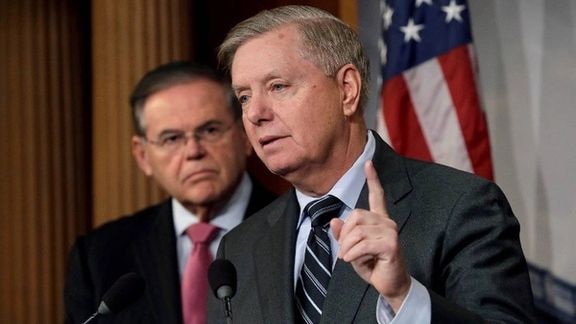
Two senior US senators have called for a regional nuclear fuel bank to provide a new approach for containing proliferation in the Mideast, including by Iran.
Democrat Bob Menendez and Republican Lindsey Graham introduced the bipartisan resolution aimed at avoiding a destabilizing arms race in the Middle East on Friday.
The resolution calls on the US government to adopt a policy that allows any Middle Eastern state access to nuclear fuel if they forgo uranium enrichment and reprocessing, based on the model of the existing nuclear fuel bank created by the International Atomic Energy Agency (IAEA).
The establishment of a regional fuel bank would allow the commercial development of nuclear power throughout the region while at the same time eliminate the need for dangerous and destabilizing domestic nuclear programs.
The proposal also makes clear that a commitment by Iran to end its enrichment program should be met with a US commitment to provide sanctions relief beyond the measures contained in the Joint Comprehensive Plan of Action.
Other sanctions should remain in place until Iran verifiably ceases its “other malign activity, including its support for terrorism, its human rights abuses, its hostage-taking, and its destabilizing activities in the region”.
Menendez, the chairman of the Senate Foreign Relations Committee, said Iran is on the brink of having enough material for a nuclear weapon, noting that “this new compromise can provide Iran appropriate sanctions relief while swinging the doors open to permanently solve this nuclear crisis once and for all”.